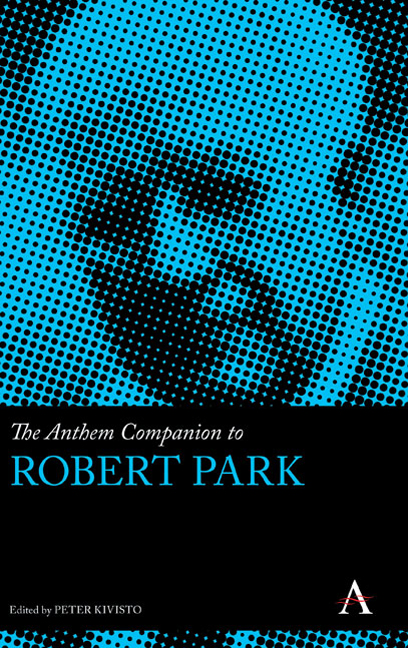Book contents
- Frontmatter
- Contents
- Introduction: The Legacy of Robert Ezra Park
- Chapter 1 A Twisted Path: Park, Gender and Praxis
- Chapter 2 Robert Park's Journey into Sociology
- Chapter 3 Beyond “Get the Seat of Your Pants Dirty in Real Research”: Park on Methods
- Chapter 4 The Basic Components of Social Action: Mead versus Park
- Chapter 5 Robert E. Park: Neglected Social Psychologist
- Chapter 6 Robert E. Park's Theory of Assimilation and Beyond
- Chapter 7 Robert Park's Marginal Man: The Career of a Concept in American Sociology
- Chapter 8 Marginality, Racial Politics and the Sociology of Knowledge: Robert Park and Critical Race Theory
- Chapter 9 The Cities of Robert Ezra Park: Toward a Periodization of His Conception of the Metropolis (1915–39)
- Chapter 10 The Impact of Robert E. Park on American Sociology of Religion
- Chronology
- Contributors
- Index
Chapter 6 - Robert E. Park's Theory of Assimilation and Beyond
Published online by Cambridge University Press: 10 January 2018
- Frontmatter
- Contents
- Introduction: The Legacy of Robert Ezra Park
- Chapter 1 A Twisted Path: Park, Gender and Praxis
- Chapter 2 Robert Park's Journey into Sociology
- Chapter 3 Beyond “Get the Seat of Your Pants Dirty in Real Research”: Park on Methods
- Chapter 4 The Basic Components of Social Action: Mead versus Park
- Chapter 5 Robert E. Park: Neglected Social Psychologist
- Chapter 6 Robert E. Park's Theory of Assimilation and Beyond
- Chapter 7 Robert Park's Marginal Man: The Career of a Concept in American Sociology
- Chapter 8 Marginality, Racial Politics and the Sociology of Knowledge: Robert Park and Critical Race Theory
- Chapter 9 The Cities of Robert Ezra Park: Toward a Periodization of His Conception of the Metropolis (1915–39)
- Chapter 10 The Impact of Robert E. Park on American Sociology of Religion
- Chronology
- Contributors
- Index
Summary
Robert Ezra Park, in conjunction with key colleagues of his at the University of Chicago such as W. I. Thomas and Ernest Burgess, is generally considered to be the sociologist most responsible for the canonical formulation of assimilation theory. However, there is little consensus about both what Park had in mind when he described assimilation and to what extent he merely presented a summary of prevailing views or developed an original position. His perspective has been portrayed by some as a theoretical articulation of the melting pot, as a synonym for Americanization, the final outcome of a race- relations cycle, and an expression of a straight- line process of incorporation. In these various interpretations it has been assumed that his particular perspective on assimilation is incongruent with, if not antithetical to, cultural pluralism or its more recent parallel concept, multiculturalism.
Park rejected the view that assimilation was a theoretical expression of the melting pot, or what Park and Burgess (1969 [1921]: 735) disparagingly referred to as the “magic crucible” version of assimilation that they associated with theories of “like- mindedness.” He emphasized the role of culture over biology. Park understood migration to be a group phenomenon, and not merely an individual one. Second, he disagreed with the Anglo- conformity view of assimilation. Third, Park granted agency to ethnics. Finally, he articulated his position in a manner that very consciously sought to divorce sociological analysis from moral preferences and ideology.
His is a “bumpy- line” version of assimilation, not as some commentators have assumed, a “straight- line” approach. Assimilation is the product of interaction and thus has a reciprocal character, although Park understood that differences in group location and power and status differences would affect outcomes. Racial hostility (he leaves out of consideration religious hostility) was consistently described as the major impediment to assimilation.
Assimilation boiled down to finding a way to live together cooperatively, playing by common rules that define the parameters of intergroup conflict. It entailed the creation of a shared national identity, which of necessity required certain commonalities, such as a shared language and core cultural values. However, it also permitted the persistence of ethnic identities and affiliations. Assimilation thus is not considered to be antithetical to a multicultural society; it does not require cultural homogeneity.
- Type
- Chapter
- Information
- The Anthem Companion to Robert Park , pp. 131 - 158Publisher: Anthem PressPrint publication year: 2017



